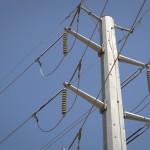Why an Environmental Group is Going After Austin’s Coal Plant

Photo by Andy Uhler/KUT News
The Fayette Power Project coal plant in La Grange, Texas. An environmental group says it's violating its permit, which the LCRA denies.
One environmental group believes that the Lower Colorado River Authority (LCRA) needs something more than just a chimney sweep to clean up its act.
LCRA was served with a notice of intent to sue last week by the Environmental Integrity Project (EIP), representing the Texas Campaign for the Environment.
The environmental group’s notice of intent cites Clean Air Act violations at the Fayette Power Project (FPP) near La Grange (about 60 miles outside of Austin) as cause for the lawsuit. Specifically, the group claims that the coal plant has exceeded limits on particulate matter emissions.
“We’ve discovered what we believe are egregious violations of the air pollution permit for the power plant and that harms public health, pollutes the air that we all breath,” said Ilan Levin, the Associate Director of Environmental Integrity Project, in an interview with StateImpact Texas.
And like many environmental vs. energy spats in the state, this is another case of He Said, She Said. LCRA General Manager Becky Motal believes the groups claims are groundless.

PHOTO COURTESY OF THE LOWER COLORADO RIVER AUTHORITY
Becky Motal, General Manager of the Lower Colorado River Authority
“This notice of intent to file yet another lawsuit with similar allegations as in a previous suit is completely unwarranted and harassing,” Motal said in a press release after they learned of the suit. “FPP [Fayette Power Project] is one of the cleanest and most efficiently operated coal plants in Texas, and I am proud of the conscientious, environmentally responsible work our employees do providing electricity to more than a million people in Central Texas.”
In 2011, LCRA was faced with a similar lawsuit. The Environmental Integrity Project, in conjunction with two other anti-pollution groups, brought six claims alleging violations at the plant. Two of those were quickly withdrawn, the LCRA says. And this March, a judge dismissed three other claims, leaving only one in the suit. That claim, related to particulate matter emissions, is now in a Houston federal court in the discovery phase. The LCRA says that claim “involves unfounded allegations” and the costs of the suit “will eventually be passed on to ratepayers.”
The Fayette Power Project is a three-unit facility providing 1,625 megawatts of electricity. The first two units, which are jointly owned by LCRA and Austin Energy, were installed in 1979 and 1980. Unit 3, owned independently by LCRA, was built in 1988.
Scrubbers were installed on Units 1 and 2 in March 2011. Those updates cost $400 million. LCRA and Austin Energy contend that the scrubbers now remove more than 95 percent of sulfur dioxide emissions.
But Levin, with the environmental group bringing the suit, claims that the plant has violated federal standards for acceptable particulate matter emissions. Emitted from smoke stacks, the soot-like material has been linked to asthma, heart disease, premature death, and other respiratory conditions by the Environmental Protection Agency (EPA).
The new lawsuit comes after the environmental group’s recent discovery of particulate matter violations committed over the past year. While the group approves the installation of sulfur dioxide scrubbers, the organization believes that the plant hasn’t done enough to trap particulate matter.
Today, filters (commonly known as baghouses or fabric filters) are used by plants to prevent the escape of particulate matter from their stacks.

PHOTO COURTESY OF ENVIRONMENTAL INTEGRITY PROJECT
Ilan Levin, Associate Director of Environmental Integrity Project
“The LCRA Fayette Power Plant doesn’t have baghouses,” Levin says. “Instead they’ve got thirty-year old electrostatic precipitators or ESPs and those aren’t working very well. In fact, what we’ve found is that the really high levels of particulate matter pollution are happening when they start those coal-fired boilers up. And they are often in start-up mode for hundreds of hours per year.” Levins says that the LCRA doesn’t turn on their pollution controls that would capture particulate matter during those start-ups. “And so during start-up, the public is exposed to excessive and very dangerous levels of soot or particle pollution,” he says.
According to Levin, the LCRA is in the process of obtaining a new permit to increase levels for particulate matter emissions from the Texas Commission on Environmental Quality (TCEQ). Right now, the LCRA has a flexible permit.
“We are trying to enforce the permit that is currently on the books,” he says. “Now EPA has already ruled that those flexible permits are illegal – that they don’t meet federal standards. And we agree with that. But nonetheless that’s the permit they have. And what we’ve found is that they’re not even meeting the limits in that awful flexible permit.”
“FPP complies with all permit limits, and in most cases emissions are well below levels set by federal and state authorities,” Motal of LCRA said. The authority says that the plant “has long been recognized as one of the cleanest coal-burning power plants in the state.”
But Levin believes that the lawsuit is now a necessary action to take.
“The answer to the question ‘Why now?’ is that we feel like we have no choice. We’ve been talking to LCRA or trying to talk to LCRA for a couple of years,” Levin says. “We haven’t made any headway. We’re only bringing this lawsuit because the state regulators and the federal regulators, that is to say the Texas Commission on Environmental Quality and the EPA, are not enforcing the law.”



